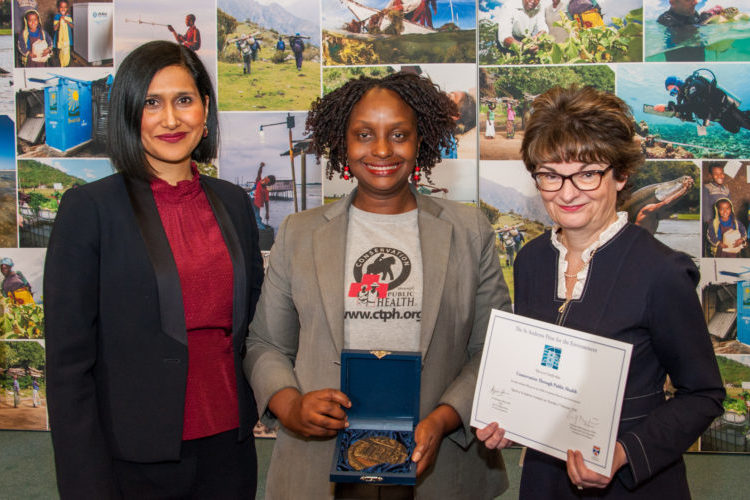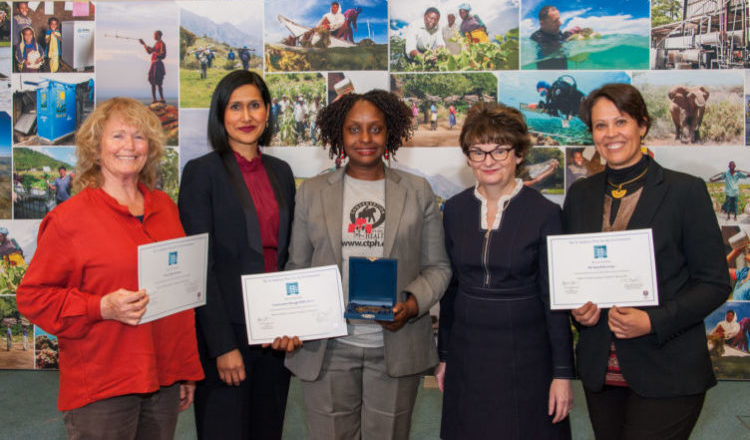Conservation Through Public Health wins St Andrews Prize for the Environment 2020

A project which takes a multi-faceted approach to conservation has won the St Andrews Prize for the Environment 2020.
Conservation Through Public Health (CTPH) was founded on the belief that conserving wildlife must go hand-in-hand with the support of neighbouring communities. Applying a unique ‘One Health’ approach, this visionary and innovative initiative bridges, synergizes and integrates approaches addressing three of the world’s greatest priorities: biodiversity conservation; health advances; and livelihood improvements for local communities.
Together with its partners, Conservation Through Public Health has not only made a significant difference, but also serves as a scalable example for others to follow. Ultimately, ‘Conservation Through Public Health’ shows that, despite pressures facing humanity and nature, bold leadership, unique innovation, and courageous action can yield hope for a sustainable future around the world.
At a ceremony at the University of St Andrews last night (Thursday 27 February), Dr Gladys Kalema-Zikusoka from Conservation Through Public Health was presented with the winning prize of US$100,000.
She said: “It is a great honour to be selected first as a finalist and then a winner for this prestigious prize. This prize will enable Conservation Through Public Health to replicate a community-based health and conservation model that we have been championing for 16 years with the endangered Mountain Gorillas of Uganda’s Bwindi Impenetrable National Park whose population is now showing a positive growth trend, to a different sub species of gorilla, the critically endangered Eastern Lowland Gorillas in the Democratic Republic of Congo.
“The prize will enable us to improve the health and livelihoods of communities who share a habitat with critically endangered gorillas and raise the international profile of ‘One Health’ as a holistic approach to achieving conservation and sustainable development.”
Celebrating its 22nd award in 2020, the Prize is an environmental initiative by the University of St Andrews in Scotland. The award recognises significant contributions to environmental issues and concerns with a focus on sustainability, conservation, biodiversity and community development.
Since its launch in 1998, the Prize has attracted more than 5850 entries from around the world and donated more than US$2 million to environmental initiatives. These projects have addressed the diverse topics of sustainable development, food security, urban re-generation, recycling, health, water and waste issues, renewable energy, community education and more. Ideas submitted have been global, local and/or scalable and they outline how they will socially and economically impact the communities where they are based.
Dr Hayaatun Sillem, Chair of the St Andrews Prize for the Environment Trustees and Chief Executive of the Royal Academy of Engineering, said: “This was another fantastic year for the Prize with applications coming from right across the globe addressing environmental challenges as diverse as deforestation, access to clean water, plastic waste and renewable energy.
“I would like to congratulate this year’s winner, Conservation Through Public Health, who inspired us with their holistic and collaborative approach to promoting the health of people, animals and the environment.”
Professor Sally Mapstone, Principal and Vice-Chancellor of the University of St Andrews, said: “Conservation Through Public Health is an outstanding winner of the St Andrews Prize for the Environment. It addresses the synergy between wildlife and human society and capitalises upon this to improve human health and wellbeing while conserving biodiversity and increasing protections for gorillas. It is an immensely inspiring, research-informed and intelligent initiative, which has produced evidence-backed results during its over 17 years of operation.
“This is the 22nd anniversary of a Prize that has spearheaded innovation and which demonstrates how global collaboration can change our environment and our lives for the better. The University of St Andrews is renowned for its leadership on critical global issues and is at the forefront of innovative solutions to the global climate emergency. I congratulate Conservation Through Public Health, whom the University is proud to support through this prize, and I look forward to watching their important impact grow.”

This year’s runners-up, each presented with a cheque for US$25,000, were:
Dirty Girls of Lesvos – Reducing Landfill Waste from Humanitarian Relief Efforts
Dirty Girls is a pioneer of the simple environmental practice of washing used materials in humanitarian relief efforts.
Dirty Girls collect good quality wet and dirty clothing discarded by thousands of people fleeing war and terror and arriving by sea on the island of Lesvos. They reuse, wash and upcycle the items to distribute to those in need. So far, Dirty Girls has saved more than 1200 tons of material from landfill.
The SmartFish Group – Value Rescue of Artisanal Fisheries
SmartFish supports artisanal fishers’ livelihoods while addressing the global issue of overfishing.
SmartFish is a pioneer of fisheries improvement projects to support local artisanal fishermen to meet growing consumer demand for sustainable seafood. SmartFish supports the commercialisation of responsible artisanal fisheries products in markets that reward fishermen for the environmental and social values of their fishing.
The full list of previous winners and details about the Prize are available online. You can also follow the Prize on Facebook and Twitter.
Category Awards